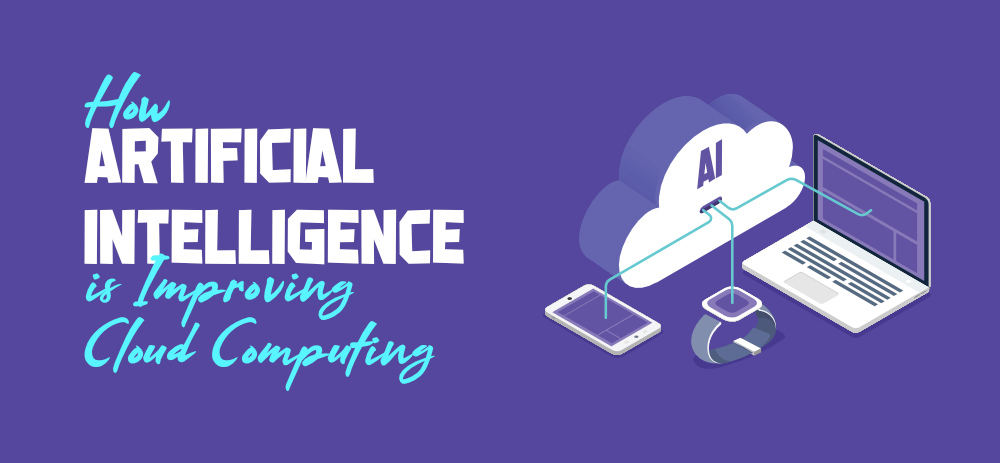The first two decades of the 21st century have seen exponential advancements in technologies that were once considered elements solely belonging to a sci-fi movie script. The information age saw the genesis of many such technologies, some of which never saw the light of the day. But two technologies that stood in their time and have now become staples today are Artificial Intelligence and Cloud Computing. In this article, we’ll take a look at what these two technologies are and how their amalgamation is proving to be a landscape-changing force in the world of modern technology.
Getting to Know Artificial Intelligence
Simply stated, Artificial Intelligence is the simulation of human intelligence by machines. Integrating Artificial Intelligence into a machine’s guts enables it to perceive and observe its environment and generate optimum outputs accordingly; much like how humans do albeit, at a much faster rate. Artificial Intelligence traces its origins in the abstract concepts of machine learning proposed by the legendary British mathematician and logician Alan Mathison Turing in the mid 20th century.
In the form that it exists today, Artificial Intelligence as a concept has come a long way since then and its applications in today’s world are innumerable and unbound. A common example would be the smartphone assistants Siri, Alexa, and Google Assistant, which have now become an inseparable part of our lives. We talk to them, give them tasks and ask them questions much like how we do with a fellow human.
With advantages such as task automation, less human interference, faster processing rates, lower error margin, etc., many industries and domains are increasingly using it to take their modi-operandi to the next level. Saying that Artificial Intelligence is a revolutionary technology would be an understatement.
Cloud Computing: An Introduction
Cloud computing or computing on cloud is a term used to denote the hosting of software services on the cloud from where users can access them as per their need. The term “cloud” is generally associated with storage and rightfully so, for initially, the cloud was popularised as a storage alternative for computing devices. Data could be stored on machines, called servers, and accessed as per requirements using networks.
As technology progressed and the internet got popular, it now became possible to use cloud servers not just for data storage but also for data processing, or computing to be exact. In 1999, Salesforce started offering software services using software applications stored on cloud servers; signaling the onset of the SAAS (Software as a service) model. Users could now request software services without having to actually install the application on their devices. All that’s needed was an internet connection.
Today, cloud computing is a mainstream technology and a myriad of industries and domains are adopting it for benefits such as data security, easy & 24*7 access, (almost) infinite storage capacity, low maintenance costs, etc.
Adding a Layer of AI on Cloud Computing
Artificial Intelligence, no doubt, is a pioneering technology having the Midas touch when it comes to scaling the functionalities of anything it’s integrated into by leaps and bounds. And cloud computing is no exception. Cloud computing allows users to efficiently store & manage their data while simultaneously providing additional benefits such as data security, encryption, regular backups, hosting applications on the cloud, etc. The idea behind coupling AI and cloud computing is to render a degree of intelligence to the current services provided by cloud computing. And it is this degree of intelligence that makes this combination of AI and cloud computing, groundbreaking.
Benefits of Integrating AI into Cloud Computing
The goal of conjoining Artificial Intelligence and Cloud Computing is to create a tool or a set of tools that can leverage the existing potential of cloud computing while concomitantly adding some extra fire-power to its already marvelous arsenal of quirks and features. Here’s how Artificial intelligence is improving cloud computing:
1. Enhanced Data Management
Today’s world is no doubt data-driven and with the prodigious size of its user-base, cloud computing deals with unimaginable amounts of data on a regular basis. Every second, a lot of data is uploaded, downloaded, collected, created, and destroyed by businesses, organizations, and individual users worldwide.
Managing such huge repositories of data and the whole cloud storage infrastructure is by no means an easy task. Hence, cloud service providers incorporate Artificial Intelligence to reduce their workload. Embedding artificial intelligence into the cloud framework helps improve data management by automating redundant tasks, identifying, sorting, and indexing different types of data, managing data transactions on the cloud, identifying any faults in the cloud infrastructure, and ultimately streamlining the whole data management process.
2. AI-ready SaaS Apps
With the advent of the SaaS (software as a service) model, it became possible to host not just data but also complex software applications and even entire virtual computers on the cloud which users could access and use as per their requirements. To improve the cloud computing experience further, SaaS application developers began to fuse AI with their applications and the result was the availability of powerful SaaS software applications that were empowered by AI and ready to offer greater functionality to end-users.
A popular example is Salesforce Einstein, Salesforce’s intelligent solution for businesses that use the power of artificial intelligence for predictive analytics, deeper data insights, comprehensive user-behavior reports, and much more, thereby providing data that businesses can use to formulate their sales strategies and increase their profits.
3. Improved Data Security
For a business, its data is at the core of its sustenance and since cloud computing is synonymous with processing massive amounts of data, it is highly imperative to ensure the safety of this data. Today, there are various network security tools available that use the power of Artificial Intelligence to implement security protocols and measures on the cloud infrastructure to curb any potential data leaks, eliminate any security loopholes, prevent data theft and unwanted data loss/corruption of the stored data.
4. Reduced Errors and Costs
One of the primary reasons behind integrating Artificial Intelligence into cloud computing is the excellent task automation it provides. Task automation ensures that there is minimum human interference and as the saying goes, “to err is human”, the less human involvement is there, the lesser the errors. This also results in a direct increase in the decision-making time and a reduction in the number of persons employed to do the previously unautomated tasks.
What the Future Holds:
It is without a doubt that Cloud Computing and Artificial Intelligence are technologies of the future. With cloud computing already on the path to becoming the de facto computing model in the coming times and AI changing the tech landscape with each passing day, it is exciting to see what revolutionary technological advancements will the fusion of these two powerful technologies bring to our lives.





